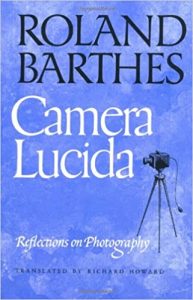[posted on behalf of a student]
When reading Bellocq’s Ophelia by Natasha Trethewey I kept thinking about the book Camera Lucida by Roland Barthes in regards to their similarities with photography. In Camera Lucida, Barthes defines a few different terms related to photography. There is the operator, which is the photographer, and the spectator, who is anyone who views the photograph. There is also punctum, which is the emotional response to the photograph, while studium is the tone or interest the image gives based on the cultural views. The photos that E.J Bellocq took that this book is inspired by were not well known until after his death and it is unknown whether these photos were taken as commissions or just for his own pleasure, though it is expected th at it is the latter. If this was the case the images were all about punctum for Bellocq and he never intended for the photographs to be seen by the public thus the studium would not have been as important.
at it is the latter. If this was the case the images were all about punctum for Bellocq and he never intended for the photographs to be seen by the public thus the studium would not have been as important.
Though the photographs were eventually shared with the public in both museums and in books. This created an importance of studium and how cultural perceptions changed how these photographs were looked at. From this there were creations of books, such as this one, and other materials that tried to take a look into the world of Storyville just as Bellocq did with his photographs. Some books like Bellocq’s Ophelia have taken the view of the women who actually worked there so it is the characters in these books that are fictionalized characters of those in the photographs and they are the ones staring at the camera, creating the art. Tretheway brings up this point in the poem “Bellocq,” “I try to pose as I think he would like―shy / at first, then bolder. I’m not so foolish / that I don’t know this photograph we make / will bear the stamp of his name, not mine” (Tretheway 39). I think that it is important to realize that in these photographs the person in the photograph is just as much an artist as the operator, or photographer. They realize just as well as the operator what kind of punctum, as well as studium, that is created by the photographs that they are a part of.